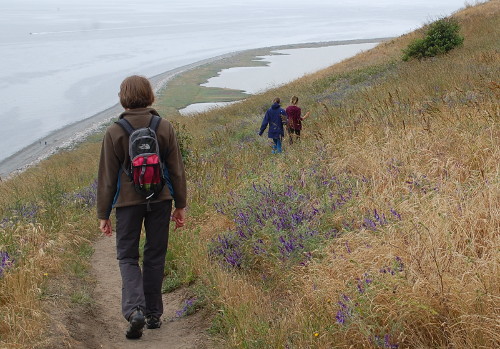SUBSCRIBE TO THE FREE NEWSLETTER
April is National Poetry Month!
Here in Cascadia, April isn’t the cruelest month (I think dreary February probably gets that distinction). But it is a time to celebrate verse in all its forms during National Poetry Month (which should really be called North American Poetry Month, since Canada officially began celebrating it in 1999).
Cascadia Magazine is a big fan of poetry, and we’re off to a good start featuring work by Claudia Castro Luna, Kathleen Flenniken, Samiya Bashir, EJ Koh, Paul Nelson, and Montreux Rotlholtz. Head over to our poetry page and have a look.
And Cascadia Magazine is open for your submissions. Send us your finest, most polished work. We’ll try to reply as promptly as possible, but please be patient. And remember to include all contact information in the text of your submission.
It’s also important to note that Cascadia has an abundance of great poetry journals (both online and print) that you should support. Poetry Northwest, Malahat Review, Crab Creek Review, Moss, Pacifica Literary Review, Poetry is Dead, The Capilano Review, and The Raven Chronicles are fantastic journals based in the Pacific Northwest. Plus, Seattle Review of Books publishes the work of one poet in residence each month. Each of these journals (and Cascadia Magazine) can’t publish great poetry without your support, so please buy copies of print editions, subscribe, or donate to your favorites.
It’ll make April a lot less cruel.
A watch house on guard against Kinder Morgan’s pipeline
The Salish Sea Sentinel reports from the Tsleil-Waututh First Nation’s “watch house” on Burnaby Mountain, BC near the planned expansion of the Trans Mountain pipeline. “It’s not a ceremonial house like a longhouse, it’s a watch house where we would traditionally watch for our enemies,” said Tsleil-Waututh member Reuben George. You can read more about George and other First Nations activists fighting the pipeline at Cascadia Magazine. Meanwhile, an editorial in The Tyee takes apart Trudeau’s argument that pipelines reduce carbon emissions. And Sightline Institute points out that even though Liquefied Natural Gas (LNG) has a reputation as a “clean” fuel, it still has a significant impact on climate.
Will unused Multnomah jail house the homeless?
OPB reports on how a nonprofit in Oregon is offering to buy an unused jail in Multnomah county and convert to a shelter for the homeless. The $58 million jail has never been used. In other housing news, Jonathan Rosenblum at the South Seattle Emerald notes the bitter irony of Amazon’s giant glass balls at its $4 billion headquarter providing shelter to exotic plants, while each night thousands sleep on Seattle’s streets.
Seattleites like to hike
The Seattle Times reports that the number of people in Seattle who like to hike has doubled in the past ten years, although we’re skeptical of the article’s claim that it’s due to the “Instagram effect.” Meanwhile, the Portland Mercury notes that Washington State parks and National Forests are bracing for an influx of Oregon hikers, since 40 popular trails in the Columbia Gorge will be closed this season after the devastating Eagle Creek Fire last summer. Looking for a great source of info on hiking? Check out the Washington Trails Association’s awesome website.
BC’s Sinixt First Nation is no longer “extinct”
After sixty years of being declared “extinct” by the Canadian government, the Sinixt First Nation of British Columbia, closely connected to the Colville Tribe of Washington, is working to reclaim official recognition. The two tribes are involved in the case of Rick Desautel, who is fighting a charge of illegal hunting in Canada, where he crossed the border and claims he has traditional hunting rights.
BC First Nations author Terese Mailhot: truth is my aesthetic
British Columbia First Nations writer Terese Mailhot, author of the candid memoir Heart Berries, talks with Guernica about her traumatic childhood on the Seabird Island Indian Reservation and a her escape from poverty: “I don’t want to be a cultural artifact. I don’t want people to read my book and think, “This gives me insight into the Native experience,” because the Native experience is just like the white experience, which is individual and singular.”
A poem by Seattle poet Jeanine Walker
This month, Seattle poet Jeanine Walker, a poetry teacher in Seattle public schools, is serving as the Seattle Review of Books’ poet-in-residence. You can read her brutally vivid poem online:
“there’s no stopping it now,
not the unfeeling hands that lift the cover
nor the grief that will live
forever in the blood of the mother…”
That’s today’s arts, culture and news from the under the gray April skies of Seattle. –Andrew Engelson
Photo credit: hikers on Whidbey Island by Andrew Engelson

